{This post is sponsored by Pacific Resources International (PRI)}
Fall is the season for rose hips, and one of my favorite things to make with them is rose hip syrup! It’s a delicious foraged recipe that can be served drizzled on pancakes or ice cream or stirred into cocktails. Rose hip syrup can also be used medicinally for immune support!
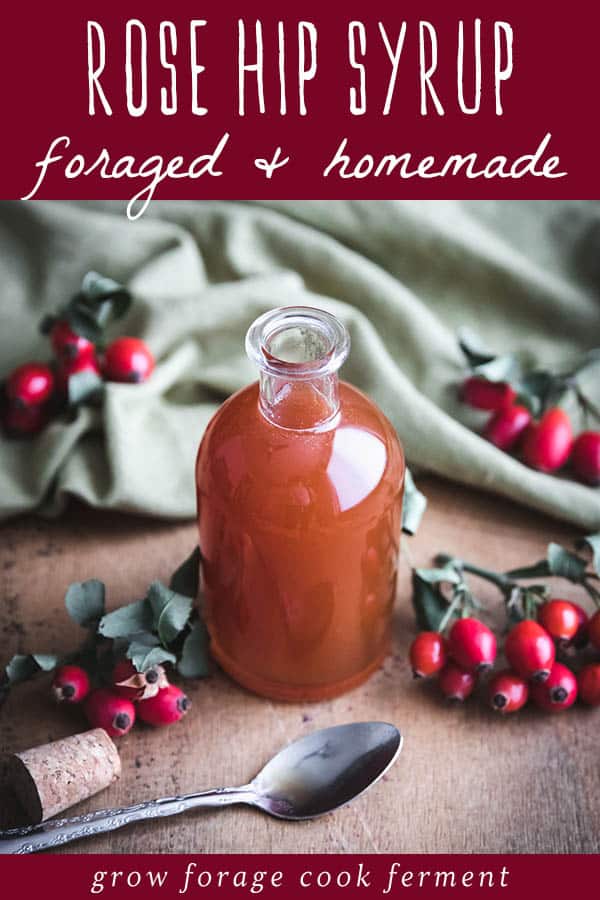
Want to save this post for later?
Pacific Resources International (PRI) Honey
To make this rose hip syrup I used pure Australian Organic Raw Honey from Pacific Resources International (also known as PRI).
I love this honey because it’s cool processed so that it retains all of the health benefits of raw honey, including some of the propolis, wax and pollen.
It is also organic, which can be hard to find when it comes to honey! It gives this rose hip syrup an extra boost of amazing goodness.
If you want even more medicinal benefits you could use PRI Manuka Honey instead!
Related: 60+ Rose Hip Recipes for Food, Health, & Beauty
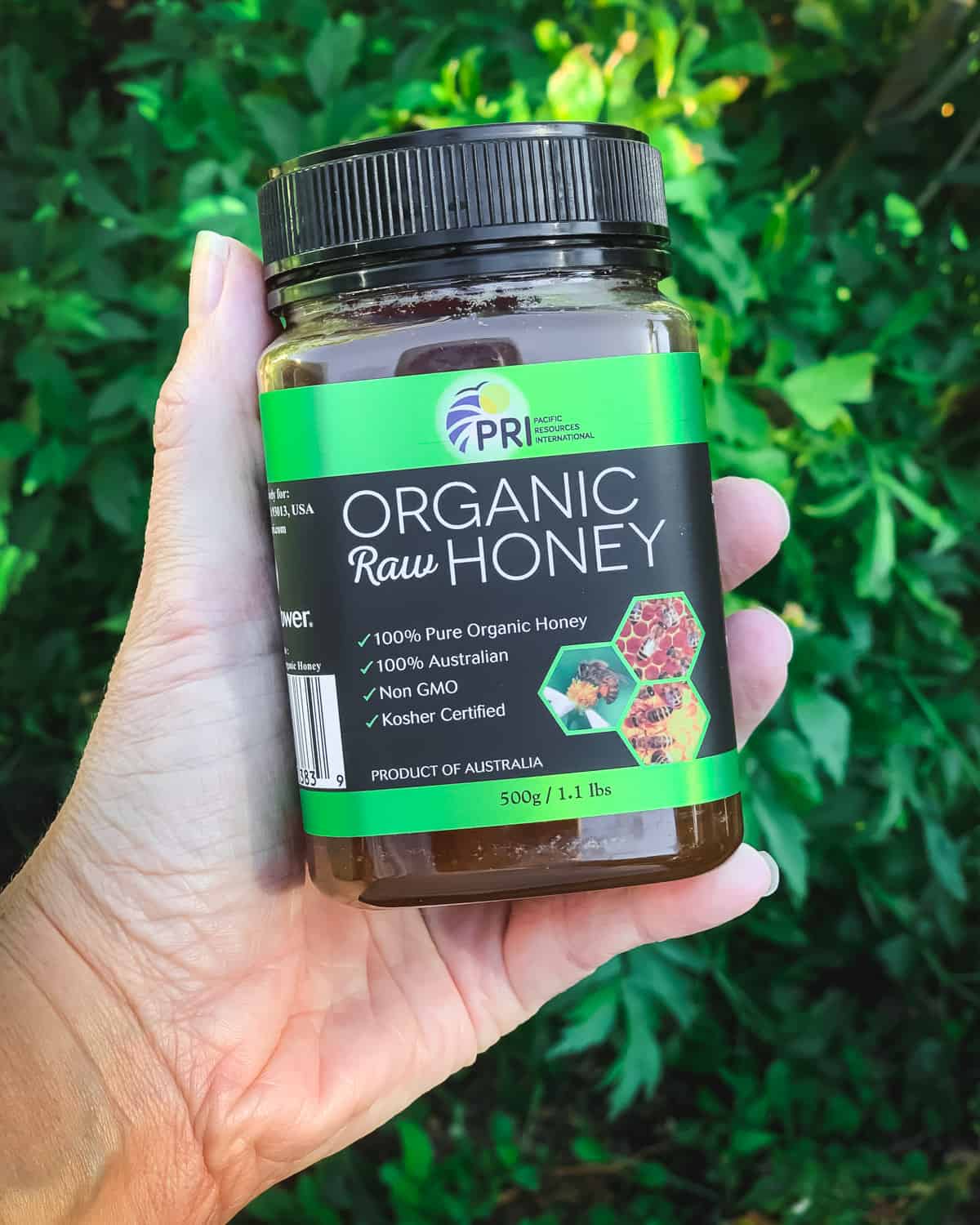
PRI Stay-Well Kit
Pacific Resources International also has a new Stay-Well Kit that is perfect for fall and winter gift giving. It includes some of their most popular Manuka honey and propolis products that help to support the immune system and keep you well!
The Stay-Well Kit includes:
- Manuka Honey 20+
- Manuka Lemon Lozenges
- Propolis Original Cough Elixir
- Propolis Oral Spray
- Manuka Lip Balm
- Wooden Honey Spoon
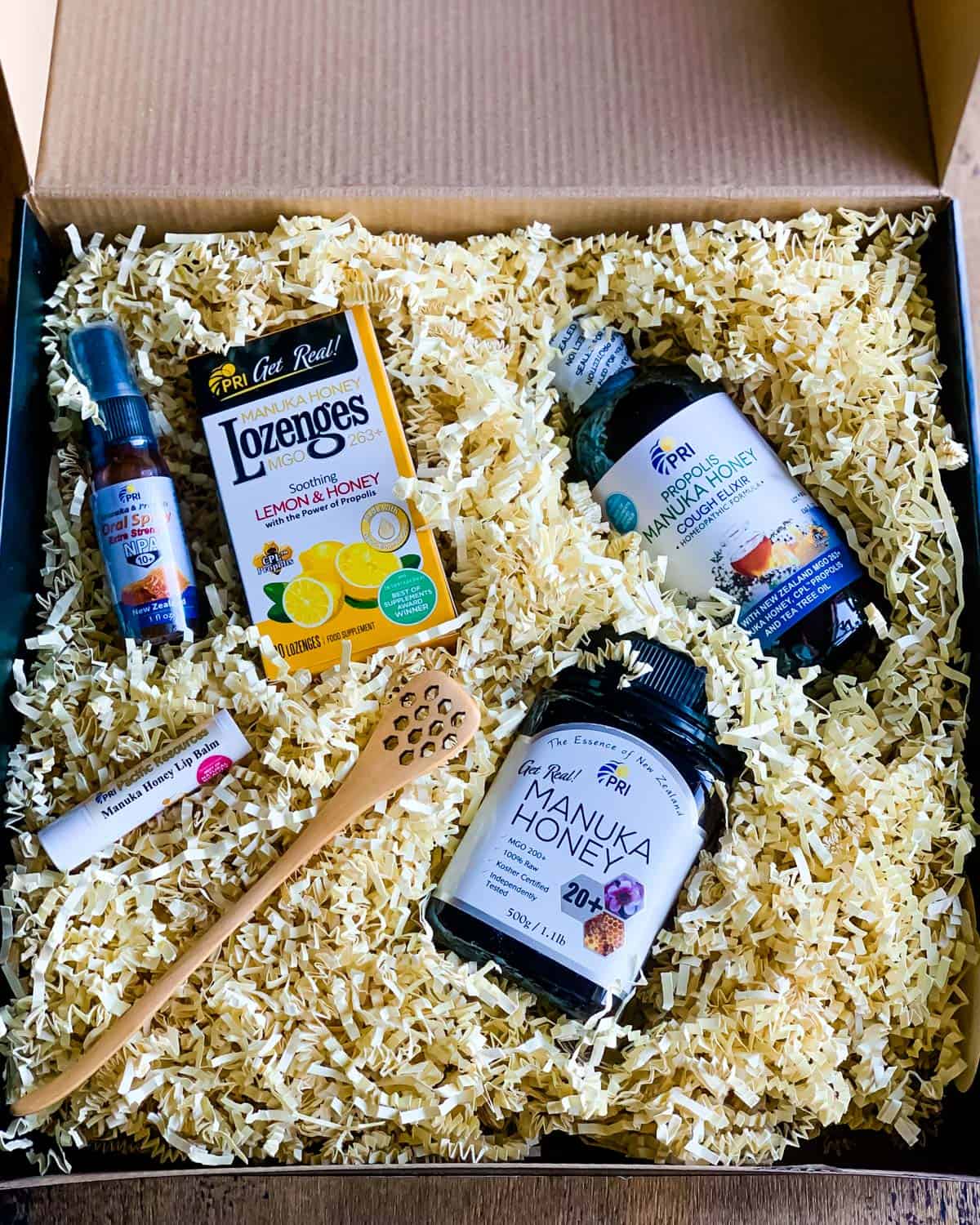
Get more winter wellness recipes for teas, infusions, syrups, honey ferments, oxymels, and gummies in my ebook Herbal Immune Support: Homemade Recipes for Wellness!
How to Make Rose Hip Syrup
This rose hip syrup is very easy to make! The hardest part is finding and collecting the rose hips, which actually isn’t that hard at all.
Where to Get Rose Hips for Syrup
Rose hips are the fruit of the rose plant and can be found throughout the fall and sometimes even into the winter season.
Foraging for rose hips is generally fairly easy as they are a common plant, both cultivated and in the wild. You will need one cup (or more) of fresh rose hips to make this syrup.
If you don’t have access to fresh rose hips, or if they are out of season, you can use dried rose hips.
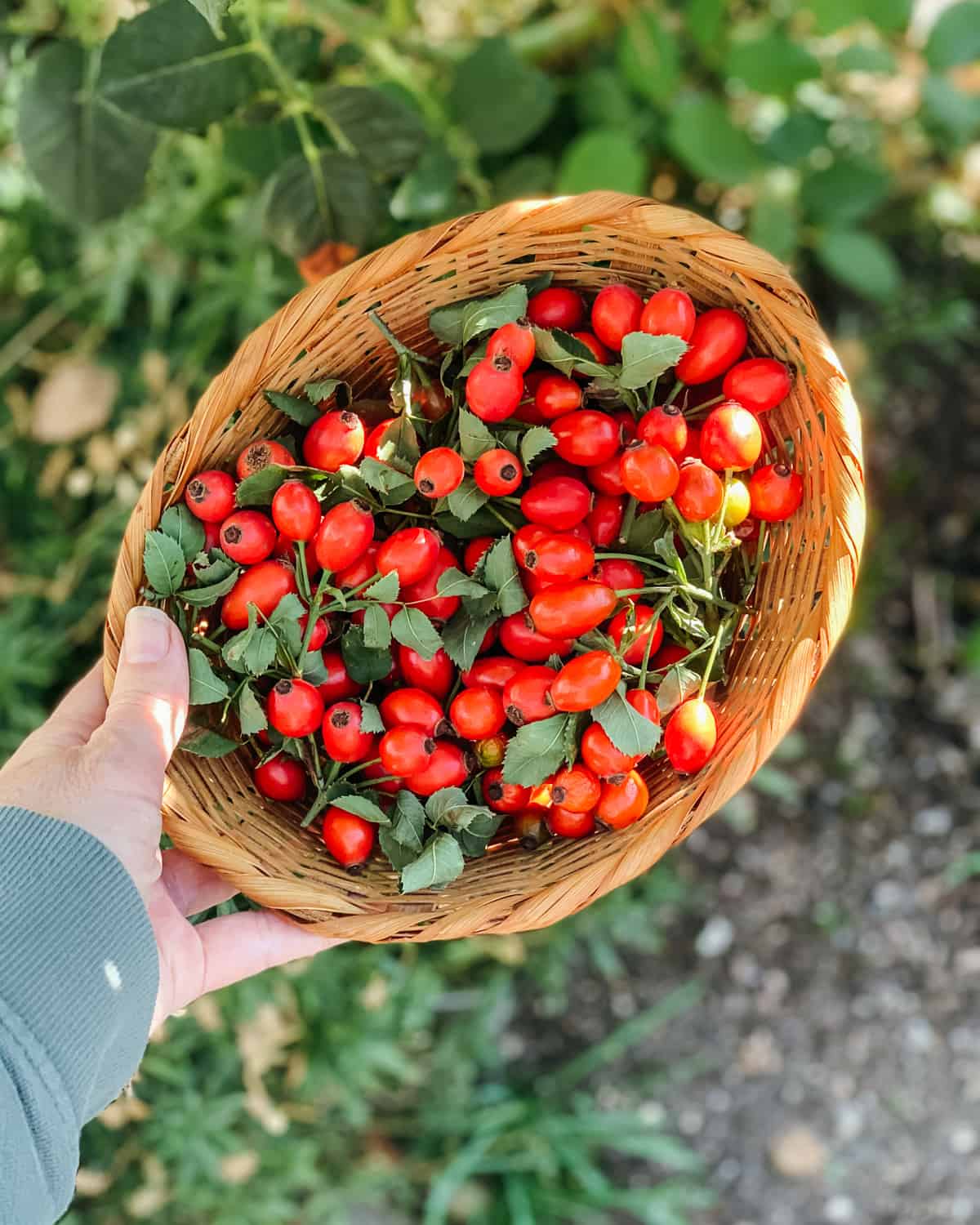
Make the Rose Hip Tea
After you’ve collected the rose hips it’s time to make the rose hip tea.
First remove any stems, leaves, and brown flower bits (called the calyx) from the hips, if needed. Then give them a rinse before putting them in a food processor.
Pulse several times to break up the rose hips into smaller pieces.
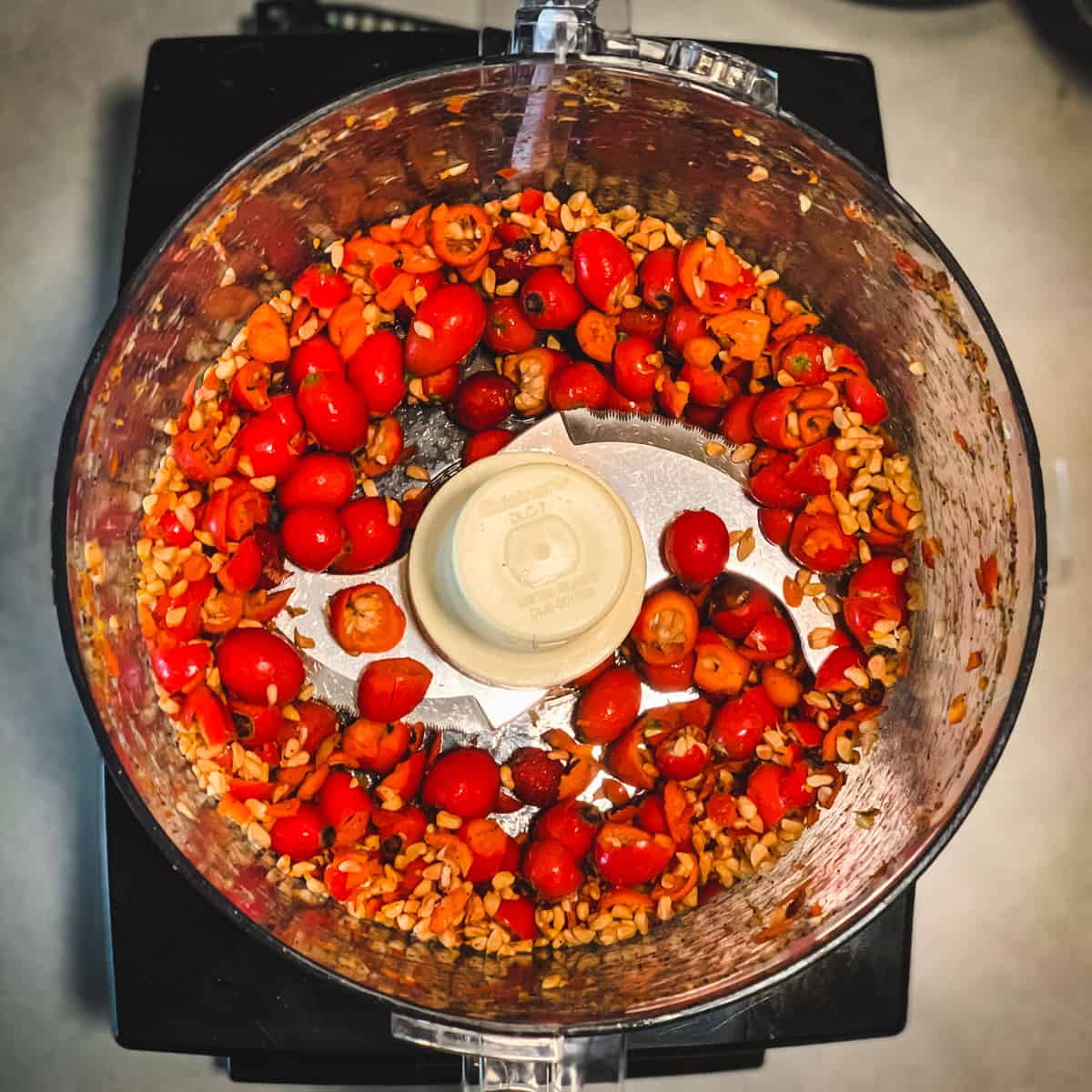
Put the broken up rose hips into a pot with water. A ratio of two parts water to one part rose hips works well.
Bring it to a boil, then reduce the heat and simmer for 15-20 minutes, or until the water has reduced by about half.
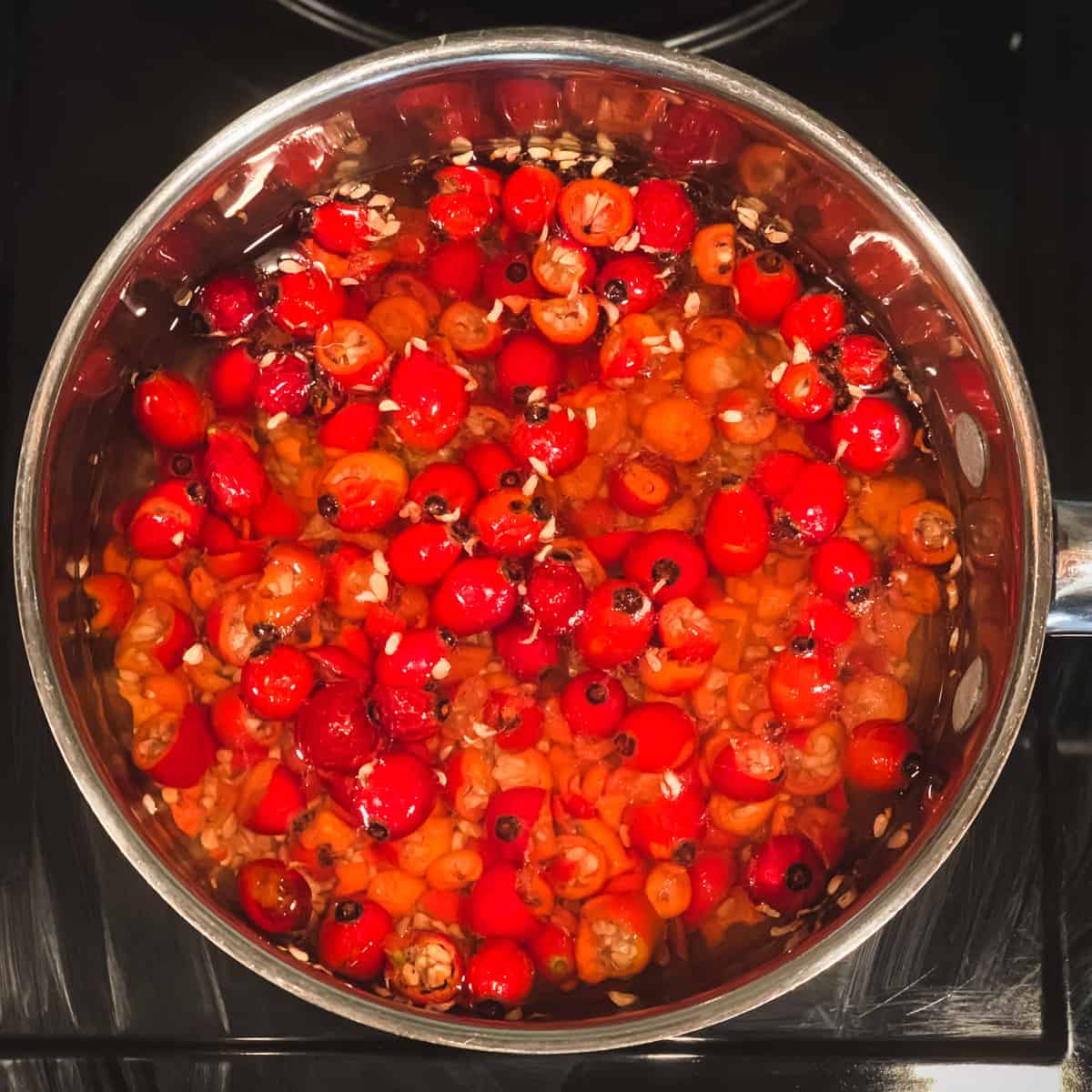
Turn the heat off and let the rose hip tea cool for a bit while it continues to steep. Then strain out the rose hips with a very fine mesh sieve.
Rose hips contain small hairs that are irritating to the digestive tract, so it’s really important to strain them out. If you don’t have a super fine mesh sieve, then line a strainer with a few layers of cheesecloth.
You can squeeze the rose hips to get all of the liquid out if need be.
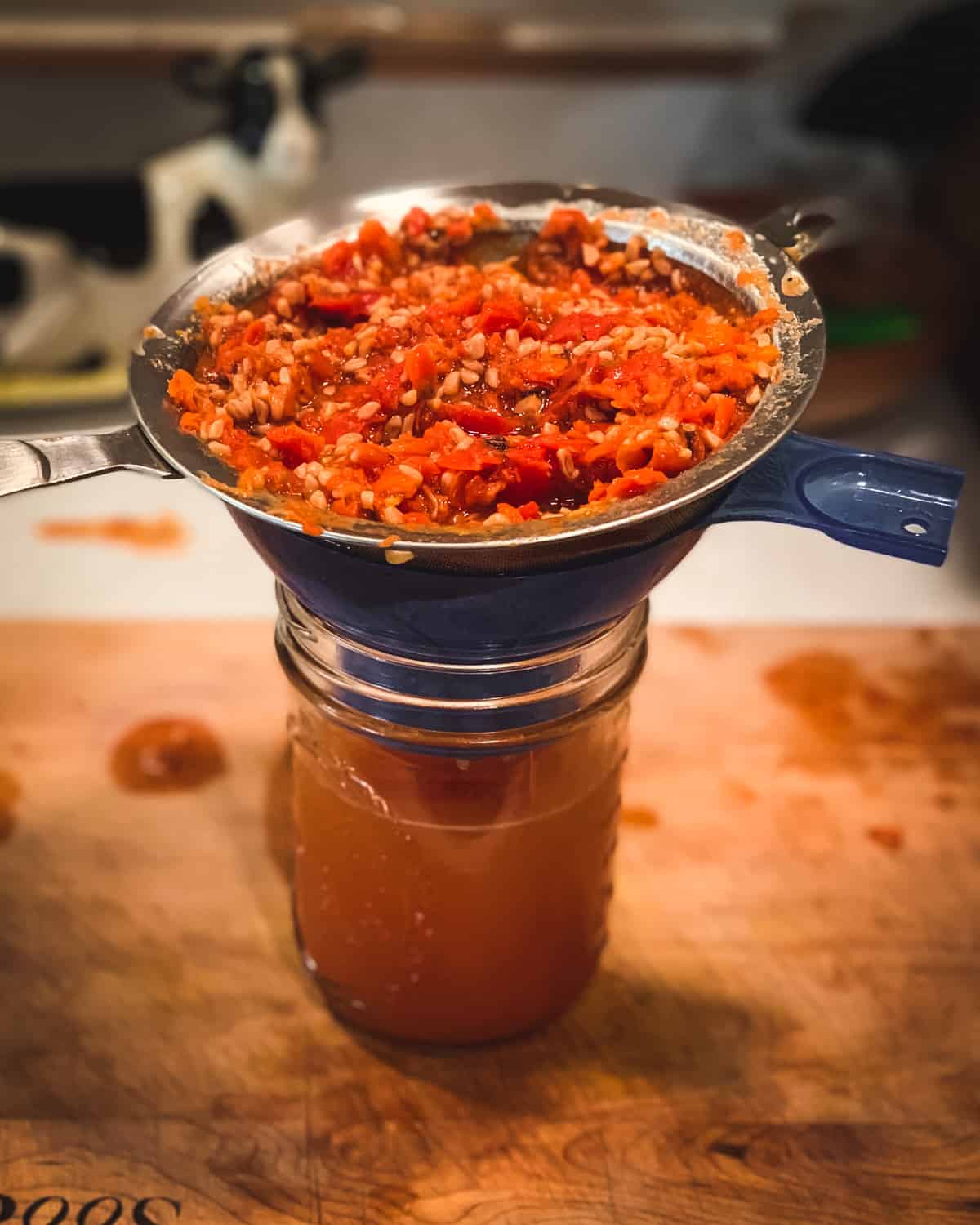
Once you strain out all of the larger rose hip solids, rinse out the mesh sieve (and the cheesecloth if you’re using it), and strain the tea through again.
Take a good look at the rose hip tea, and if you still see tiny hairs floating around it’s a good idea to strain it again, maybe with even more layers of cheesecloth.
You really want to make sure to get all of those hairs out! Mine looked good after straining twice through my super fine mesh sieve.
Make the Rose Hip Syrup
Now it’s time to make the syrup! This is the easy part.
Make sure that the rose hip tea has cooled down to room temperature, then add the honey. An equal volume of honey to tea is usually perfect, so if you have one cup of rose hip tea, then add one cup of honey.
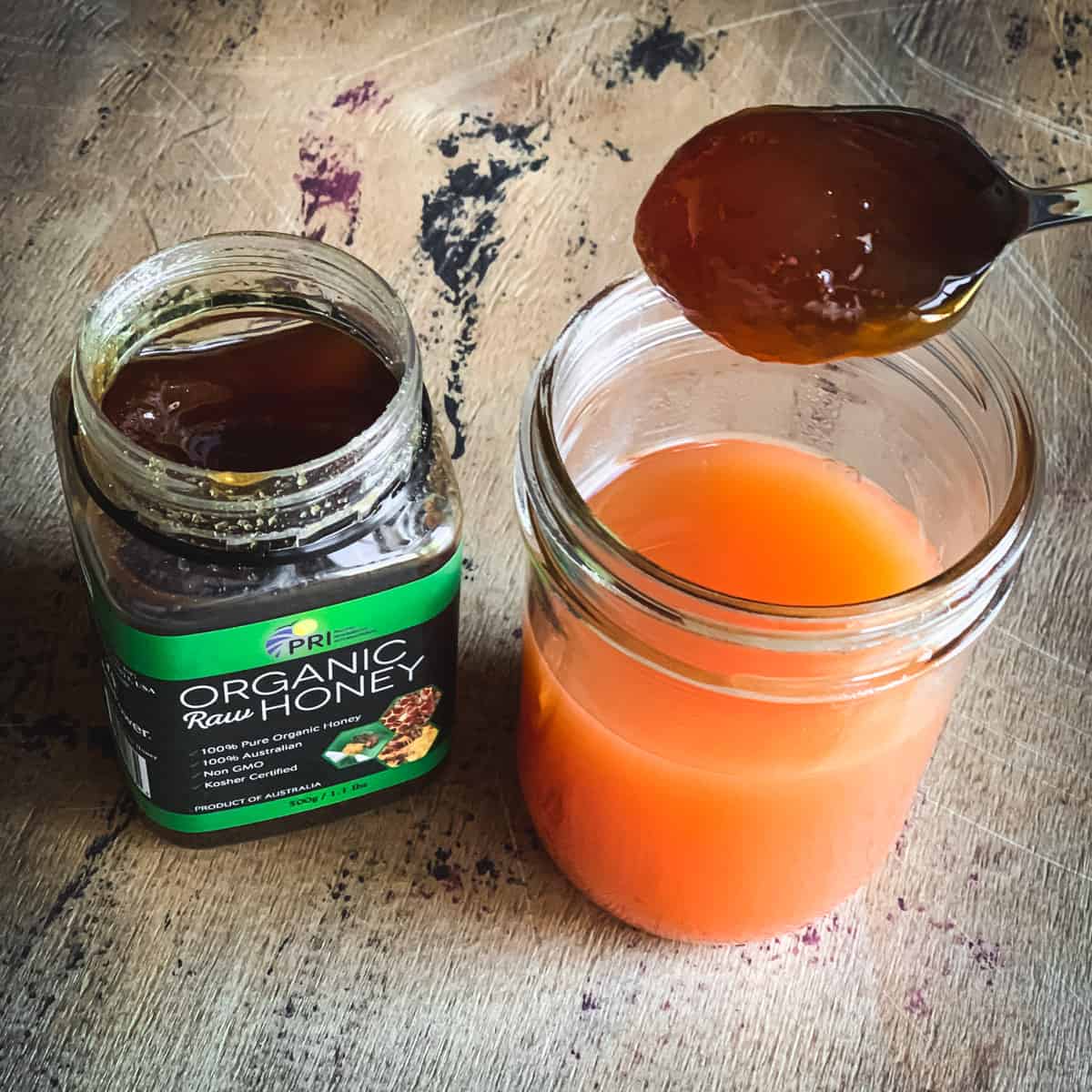
Stir to combine the honey with the tea, and then you have some amazing rose hip syrup!
Store the rose hip syrup in the refrigerator and it will keep for up to 6 months. It can also be frozen for longer storage.
Rose hips have varying levels of natural pectin. If you happen to get some with a lot of pectin it can sometimes cause the syrup to become more jelly-like, especially after being refrigerated.
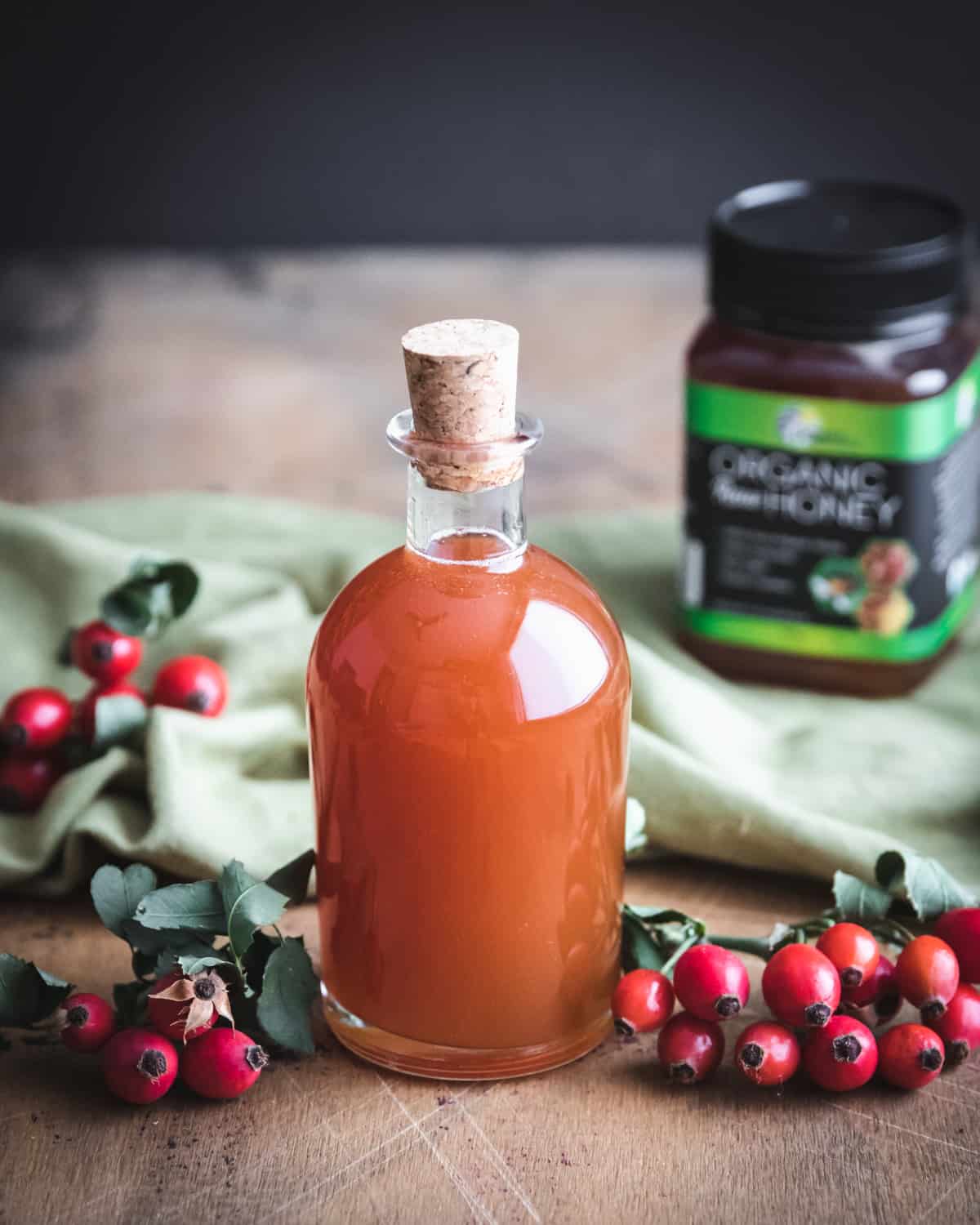
Edible Uses of Rose Hip Syrup
This rose hip syrup has many great uses!
For culinary purposes, it can be used just like any other syrup – drizzled over pancakes, waffles, yogurt, or ice cream.
Rose hip syrup also makes amazing cocktails! Try it in this rose hip whiskey smash, or this rose hip highball.
If it becomes jelly-like in the refrigerator, it still be used in the same way as syrup, with the added benefit of being spreadable like jelly!
For more delicious culinary syrups and honey, see my Forsythia Flower Honey Syrup and Lilac Flower Infused Honey recipes.
You may also be interested in my Fermented Honey Cranberries!
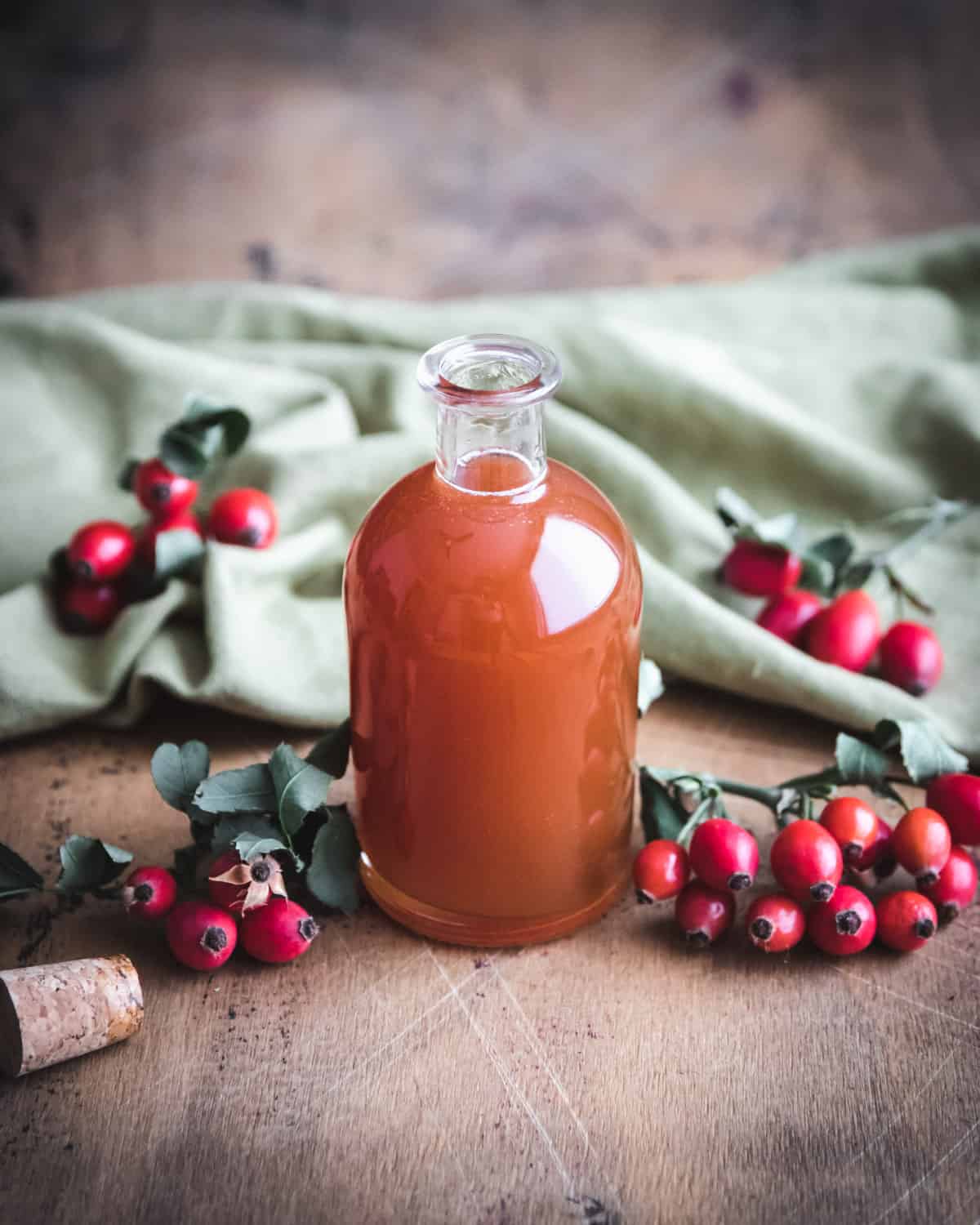
Medicinal Uses of Rose Hip Syrup
Rose hips are extremely high in vitamin C and are excellent for immune support.
Raw honey is full of powerful antioxidants, nutrients, and enzymes that are still intact because it has never been heated.
This makes rose hip syrup a great choice to use for coughs, sore throats, or other cold and flu symptoms.
I recommend adults take 1-2 tablespoons of rose hip syrup 2-3 times per day at the onset of a cold or flu, and throughout the duration of the illness. It is also safe to be taken as a preventative.
For another foraged syrup made with honey that is good for coughs and sore throats, see my Pine Needle Cough Syrup recipe.
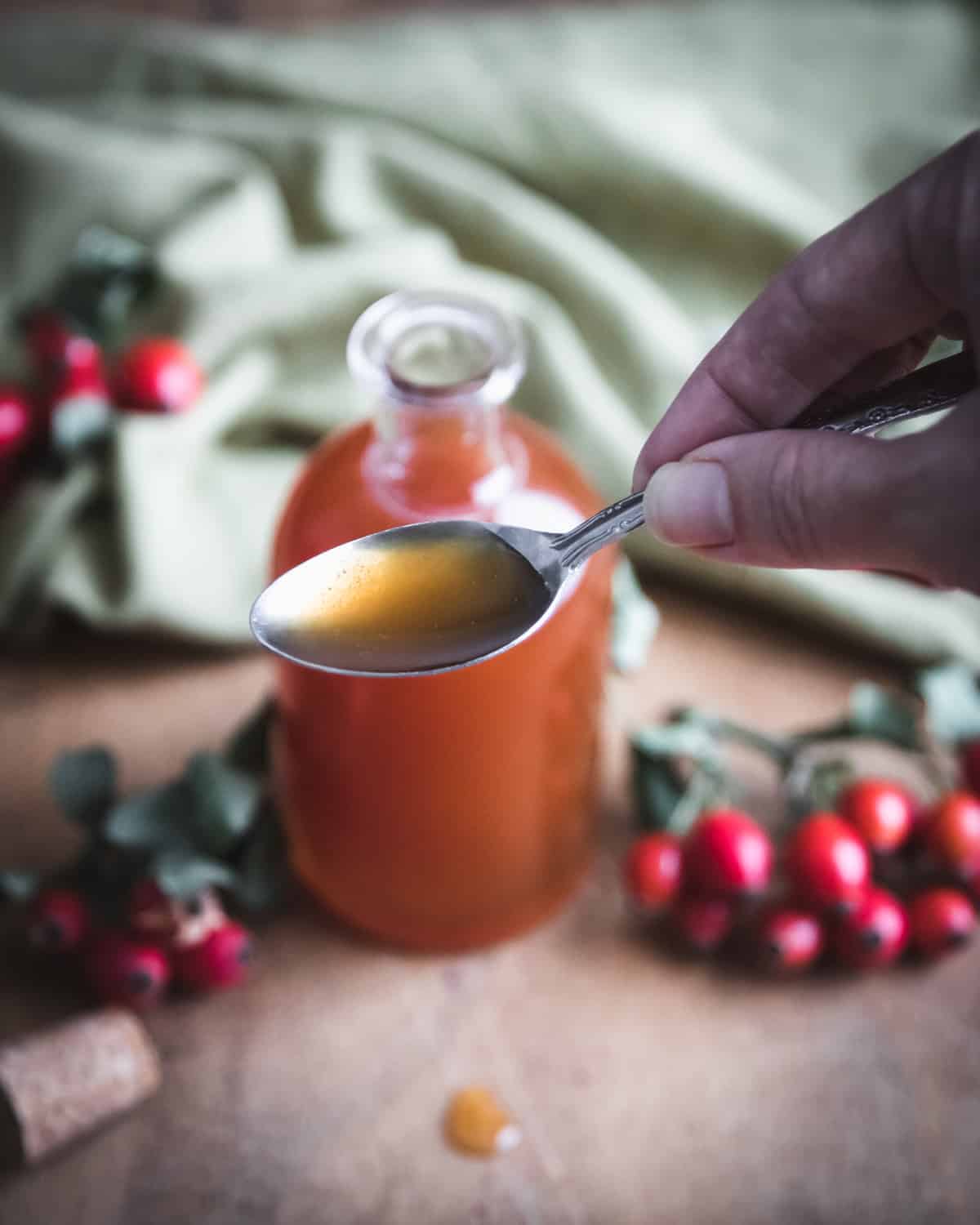
Rose Hip Syrup for Children
Rose hip syrup is safe and an excellent herbal choice for children over the age of one.
Just be sure to give children a smaller dose based on their size. For small children (ages 1-5), 1-2 teaspoons twice per day is good. That amount can be increased as the child grows.
Rose hip syrup should not be given to children under the age of one due to the raw honey.
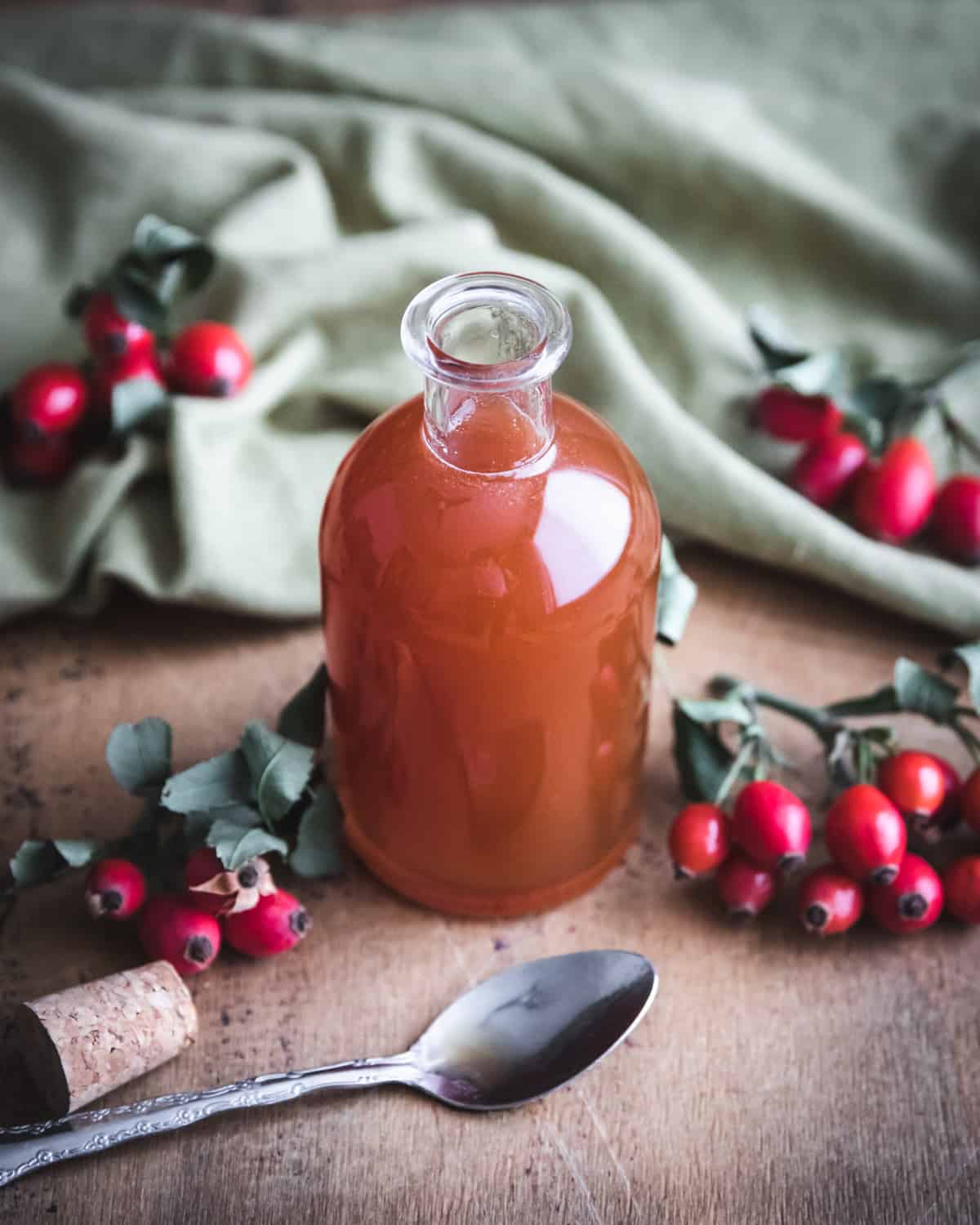
More Rose Hip Recipes
- Rose Hip Tea with Fresh or Dried Rose Hips
- Homemade Vitamin C Gummies with Rosehips
- Rose Hip Facial Oil: Homemade Face Serum
- Reishi Mushroom Infused Red Wine with Rose Hips
- Rose Hip Lip Balm for Soothing Dry Lips
- Rose Hip Whiskey Smash: Foraged Fall Cocktail
More Herbal Syrup Recipes
- Thyme Cough Syrup
- Dandelion Syrup
- Wild Violet Syrup
- Pine Needle Cough Syrup
- Forsythia Syrup
- Elderberry Syrup
- Lilac Syrup
- Rhubarb Syrup
More Honey Based Herbal Remedies
Support your immune system with these honey based herbal remedies!
- Manuka Honey Vinegar Elixir
- Elderberry Syrup
- Pine Needle Cough Syrup
- Herbal Oxymel with Sage & Ginger
- Fermented Honey Garlic
- Fermented Elderberry Honey
- Thyme Cough Syrup
Rose Hip Syrup with Honey
Equipment
Ingredients
- 1 cup fresh rose hips or 1/2 cup dried rose hips
- 2 cups water
- 1 cup organic raw honey
Instructions
- Remove any stems, leaves, and brown flower bits (called the calyx) from the hips, if needed, and rinse them well.
- Put the rose hips in a food processor and pulse them several times to break up the rose hips in smaller pieces. This step may not be necessary if you are using dried rose hips that are already broken up.
- Add the rose hips and water into a small pot with water and and bring to a boil. Then reduce the heat to medium low and simmer for 15-20 minutes, or until the water has reduced by about half.
- Turn the heat off and let the rose hip tea cool for a bit while it continues to steep, mashing a few times with a potato masher to extract all of the rose hip juice.
- Strain out the rose hips with a very fine mesh sieve lined with a few layers of cheesecloth. Squeeze the rose hips to get all of the liquid out if need be. Rinse out the mesh sieve (and the cheesecloth if you’re using it), and strain the tea through again. You may even want to do this a third time to remove all of the irritating hairs.
- Once the rose hip tea has cooled down to room temperature, stir in the honey.
- Store the rose hip syrup in the refrigerator and it will keep for up to 6 months. It can also be frozen for longer storage.
Notes
- If you end up with less than one cup of rose hip tea, you can add more water to the rose hip mash and boil it again, repeating the simmering and straining process.
- Rose hips have varying levels of natural pectin, and if you happen to get some with a lot of pectin it can sometimes cause the syrup to become more jelly-like, especially after being refrigerated.
- To use medicinally, I recommend adults take 1-2 tablespoons of rose hip syrup 2-3 times per day at the onset of a cold or flu, and throughout the duration of the illness. It is also safe to be taken as a preventative.
- Rose hip syrup is safe for children over the age of one. Just be sure to give children a smaller dose based on their size. For small children (ages 1-5), 1-2 teaspoons twice per day is good. That amount can be increased as the child grows.
- Rose hip syrup should not be given to children under the age of one due to the raw honey.



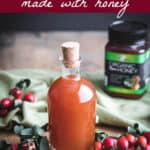
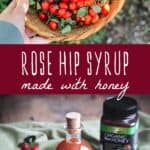
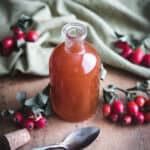

It’s all new to me .
Could you use a juicer instead of squeezing the juice out that way you get all the juices out .
They have very little juice and lots of seeds, so simmering them in water is the best way to extract their goodness.
HI, Can one freeze the tea without adding sugar?
Sure!
I read, although I don’t remember where, that using metal with honey destroys or disrupts the medicinal aspects of honey, which is why the wooden gather sticks come with wooden honey containers. Do you have more information about this? I now use only wood gatherers, spoons or knives/spreaders since reading that information as it made sense to me.
That’s a myth.
Do you think homemade vegan dandelion honey would be good in place of normal honey? Or would it mess up the recipe?
I think that should be fine!
I have been trying to find information on how the heating effects the Vitamin C level and haven’t been able to find anything about it. I know heat/light will degrade the vitamins somewhat, but I don’t know how much in this case. Do you have any info on that?
Also, what if you don’t want it that sweet? If you use less honey and still refrigerate I’m assuming it will be fine? Thanks
I’m not sure how much vitamin C is lost in the heating process, either. If you don’t want it as sweet, you can certainly use less honey, but it’ll have a shorter shelf life once refrigerated since the honey preserves it.
Thanks very much for this. I shared it with my cousin Della as she is a medicine woman and as gar as I know she doesn’t make it
Can this be made with frozen rosehips?
Yes!
I made this, but it fermented – luckily I had put it in a screw-top bottle, so could release the ‘gas’/syrup slowly ….. but I lost the whole bottle of syrup!! It’s never done this when I’ve made it with sugar!! What went wrong??!
Did you store the syrup in the refrigerator after making it? It will ferment when unrefrigerated.
I made this tonight and it’s delicious. I only needed to strain once. After the first strain, I made a little extra tea and added to my herbal tea.
I’m so glad you liked this recipe!
Thank you for sharing this recipe :) I made rosehip syrup with sugar two years ago but I am keen to try it with honey this year!
You’re welcome, Jenna. Enjoy!
You can do the final strain through a coffee filter.
Thanks for sharing! That’s a good idea!